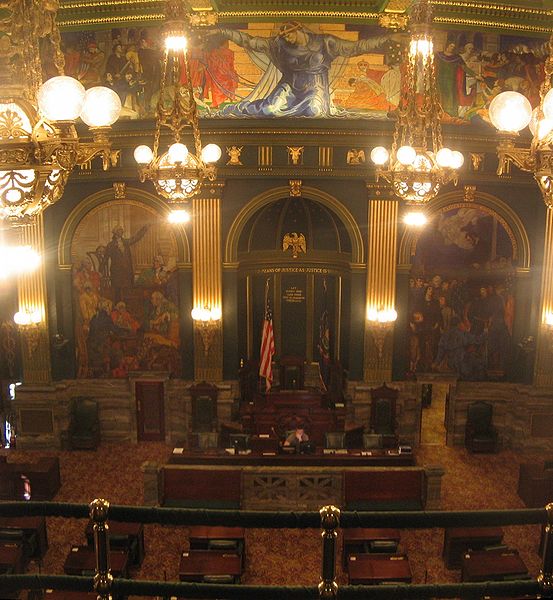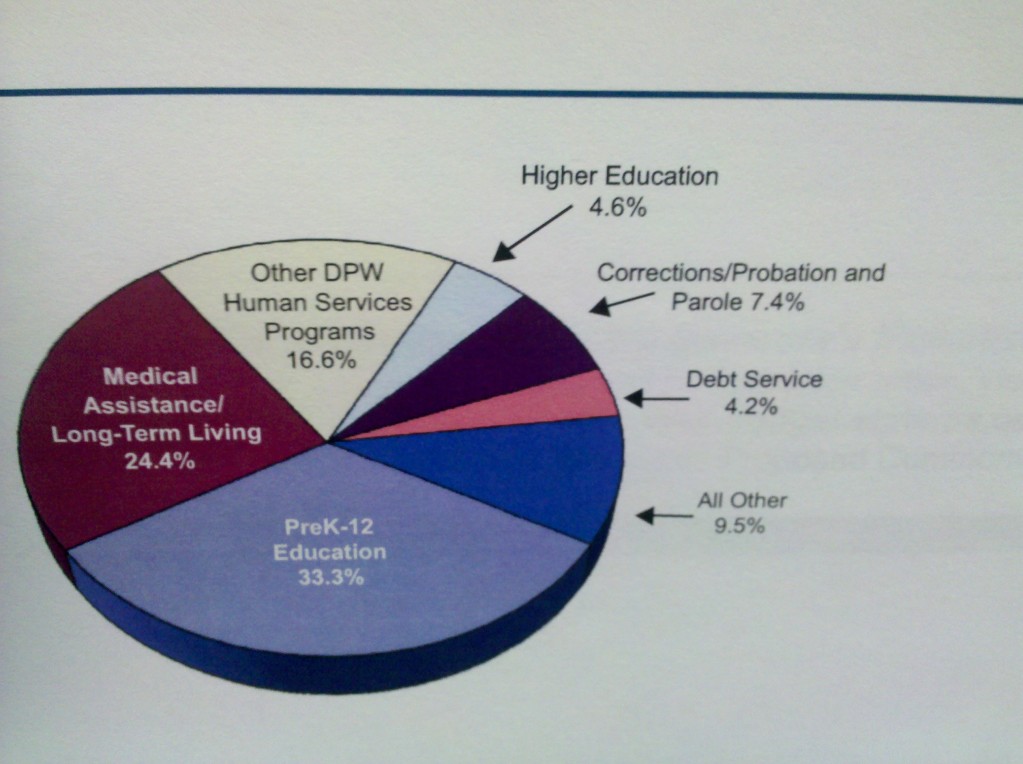Posts
Governor Tom Corbett on his 2011 legislative victories
/in Ask the Governor, Media, News, Video /by PAMattersNew Department in Limbo
/in News /by PAMattersThe first new state department since 1995 was to be created in July, under Act 50 of 2010. To date, however, the Corbett administration has not taken the steps to establish a new, cabinet-level Department of Drug and Alcohol Programs.
Budget Secretary Charles Zogby appeared before the House Human Services Committee to explain the delay, and testified that financial pressures make the change impractical. Zogby notes that current finances warrant a look at the consolidation of departments, not the creation of a new one. “We are going to have to think fundamentally different about how we deliver state services in this commonwealth,” Zogby says.
Both the minority and majority committee chairmen think otherwise. “There are huge costs in human suffering, crime, lost work productivity and increased health care as a result of leaving addictions untreated,” says Democratic Chairman Mark Cohen (D-Philadelphia), who says inaction will not save money. “The argument by talking about all the budget pressures you’re under, I think you’re making a perfect argument about why we need this new department,” adds GOP Chair Gene DiGirolamo (R-Bucks).
Pennsylvania currently has a Bureau of Drug and Alcohol Programs within the Department of Health. The new law would elevate that bureau to a cabinet-level department. Supporters say a central agency will better coordinate treatment and prevention efforts. Zogby counters that better management of the existing 25 state programs that address addiction could accomplish the same goals.
Survey Shows How Schools Balanced Budgets
/in News /by PAMattersThings are a bit different this school year, according to a report from the PA Association of School Business Officials (PASBO) and Pennsylvania Association of School Administrators (PASA).
The groups surveyed Pennsylvania’s school districts and found that 44% have reduced elective course offerings, and even some core subjects. 35% have reduced or eliminated programs that provide struggling students with extra help, and 20% eliminated summer school programs.
“It wasn’t any silver bullet, it was a combination of both personnel and programmatic reductions in order to get [districts] within their balanced budget,” PASBO executive director Jay Himes tells Radio PA. He says this will not be a one year problem, stressing school districts’ rising pension obligations.
The school districts responding to the survey reported that 8,365 positions were eliminated through furloughs and unfilled vacancies. Statewide, the groups say, this means more than 14,000 affected jobs. 294 of Pennsylvania’s 500 school districts responded t o the PASBO/PASA survey.
Pennsylvania lost 1,300 jobs in the Education & Health Services supersector, in August, according to the Pennsylvania Nonagricultural Wage and Salary Employment report. The statewide jobless rate now stands at 8.2%.
President of the Pennsylvania State Education Association (PSEA) Michael Crossey says teachers predicted that students would feel the consequences of state budget cuts. “This report confirms our predictions,” Crossey said in a statement. The PSEA is the state’s largest teachers union.
When accounting for the loss of federal stimulus money, basic education funding decreased by about $400-million, in the state’s FY2012 budget. Other education line items to take significant hits were the Accountability Block Grants ($150-million), and the elimination of state reimbursements for charter schools ($220-million).
Governor Tom Corbett has said the reduction in K – 12 education spending is the direct result of the end to the federal stimulus program. He says school districts should not have balanced their budgets with stimulus dollars.
Governor Tom Corbett on future state funding for education
/in Ask the Governor, Media, News, Video /by PAMattersobject width=”560″ height=”345″>
Two-and-a-Half Cheers for Larry Farnese
/in Reporters Blog /by Brad ChristmanThe old saying is supposed to start out “THREE cheers for (insert man-of-the-hour here).” Sadly, I have to withhold the final half-cheer, although on the state Senate floor last night, Philadelphia Democrat Lawrence Farnese gave one of the best 3-minute speeches the chamber has seen in some time.
As I watched the Senate proceedings continue past 8:30pm, Democrats were in the process of blocking funding for the state-related universities. These are the bills that send state money to institutions like Penn State, Temple, the University of Pittsburgh and Lincoln, as well as a veterinary school at the University of Pennsylvania. After days of being frozen out of budget talks, Democrats apparently thought this ill-advised tactic would be their best course of action, and it was their only chance to cause anything more than a ripple in the budget process. That’s because these so-called non-preferred appropriations bills require a 2-thirds majority in the House and Senate, and while their majorities are solid, Republicans do not have that big of an advantage in either chamber.
So, Democrats voted in the negative on bill after bill, depriving the schools of any funding…all in the name of protecting them from 19% funding reductions (in school, I was taught that 100% cuts are bigger than 19% cuts, but I digress). Republicans chimed in that the tactic could delay the funding until the fall, Democrats said they were holding out for some of that “surplus” money the state has collected this year.
That’s when Senator Farnese approached the microphone, and for three minutes chastised both parties and the overall budget process:
Listen to Senator Larry Farnese Blast the Budget Process
“…if the reason (for) what we’re doing is to prove a point, or because negotiations have gone on and we’re not a part of them, that’s a problem with the process and that’s a problem with this chamber.”
The senator was correct on all counts. The battle over state-related university funding is just the latest in a long line of questionable tactics pulled by both sides as they trade off majority control from session to session. Here, finally, someone stood up and said so.
Senator Farnese had the chance to make it a serious stand by breaking from his party’s ranks and voting to allow the funding for the schools, but his umbrage stopped just short of allowing that. Vocalizing your outrage is great, but speaking through your actions is an even more powerful expression. And, that’s where Senator Farnese lost half a cheer last night…
Democrats Take Their Swing
/in News /by Brad ChristmanOutnumbered in both the House and Senate, Democrats in Harrisburg have just one bullet in their gun, and on Monday they pulled the trigger.
In both the House and Senate, Democrats blocked passage of several non-preferred spending bills associated with the state-related universities, which include Penn State, Pitt, Temple, Lincoln and the University of Pennsylvania. The schools would have to endure 18-19% cuts to their state funding under the bills, but the negative votes by Democrats could put 100% of the funding at risk.
The move was possible because non-preferred appropriations bills require passage by a 2-thirds majority vote in both the House and Senate.
Republicans characterized the move as a dangerous game of chicken, and say the negative votes could stall the funding until at least this fall or beyond. Democrats say they rejected the funding to hold out for further restoration of cuts to the schools. The latest proposals had restored hundreds of millions of dollars from Governor Tom Corbett’s original plan to trim the universities’ funding by more than 50%.
Democrats want to tap into this year’s estimated $600-700 million in additional revenue collections to restore the cuts. Failure to pass funding for the state-supported universities would not stand in the way of passage of the overall General Fund budget plan, which is expected to get its first vote on the Senate floor as early as today.
Amended Budget Goes to Full Senate
/in News /by Brad ChristmanSenate Republicans unveiled the latest version of the FY2012 state budget late Monday during a Senate Appropriations Committee meeting in Harrisburg. The measure passed 16-10 along party lines. The $27.148 billion spending plan also has the approval of Governor Tom Corbett and House Republicans, who signed off on it during closed-door budget talks.
The budget restores hundreds of millions of dollars in education spending cuts, but Democrats say it’s not enough. Democratic members of the Senate Appropriations Committee tried unsuccessfully to restore or increase funding to several line items through amendments that attempted to bolster human services, AIDS funding, the now-defunct AdultBasic health plan, the arts and tourism, among others. Each amendment failed by the same 16-10 party line vote.
Senate Appropriations Chairman Jake Corman (R-Centre) says this budget proposal spends responsibly while respecting the billions of dollars in debt the Commonwealth is now carrying.
The budget bill is expected to go to the full Senate today.
Final Days of the State Budget Process Are Here
/in News /by Brad ChristmanBoth the state House of Representatives and state Senate gaveled in rare Sunday voting sessions over the weekend, as the two chambers brace for the final flurry of legislative activity expected this week before the summer break. Thursday is the deadline for the state budget, and despite some minor delays in the Senate over the weekend, leaders still say the deadline can be met for the first time since 2002.
In addition to budget-related bills, House lawmakers dealt with a distracted driving measure that would ban all texting while behind the wheel and legislation that limits liability for damages to the percentage of responsibility in civil lawsuits. Those bills could see final House action this week.
The Senate is expected to begin working through budget amendments on Monday after dealing with non-preferred appropriations bills for state-related universities among its action on Sunday. The debate over funding for higher education, which was a big part of Sunday’s floor activity, is expected to continue this week.
Off the floor on Sunday, House and Senate Democrats continued their call for a Marcellus Shale extraction tax or state impact fee. Governor Tom Corbett says he won’t even consider such a proposal and he wants any “impact fees” kept local and completely separate from the General Fund budget talks.
One Week Remains Before State Budget Deadline
/in News /by Brad ChristmanState budget negotiations continue in Harrisburg as the Corbett Administration attempts to iron out differences with fellow Republicans in the legislative leadership. Their goal is to have a spending plan signed and in place one week from tonight, making this the first budget deadline met in 8 years.
Governor Tom Corbett said last night that he remains confident that a deal can be reached in time to meet that deadline, but there are indications that his confidence is not shared by the Senate leadership. Drew Crompton, Chief of Staff to Senate President Joe Scarnati, says the governor’s refusal to discuss a proposed Marcellus Shale “impact fee” has the potential to push the process beyond June 30th. The governor has previously stated that the impact fees are to be kept separate from the general fund budget and he refused to comment on whether or not they were a part of Wednesday’s talks. Corbett does list tort reform and school vouchers as two major issues that need to be discussed before party leaders can agree on a budget.
Senate Majority Leader Dominic Pileggi previously stated that a handshake agreement of sorts would need to be in place by today if the budget had a chance to pass by June 30th. As talks ended last night, indications were that such a “gentleman’s agreement” is still elusive.
Meanwhile, state Democrats are critical of the budget negotiation, calling it a “behind closed doors” process. Republicans control the House, Senate and Governor’s office in Harrisburg.
Welcome to PAMatters.com, a new source for news and commentary from Pennsylvania’s capital. In addition to video, audio and pictures from the stories and events that affect YOU, you’ll also get some behind-the-scenes analysis via blogs from our award-winning staff of journalists.









